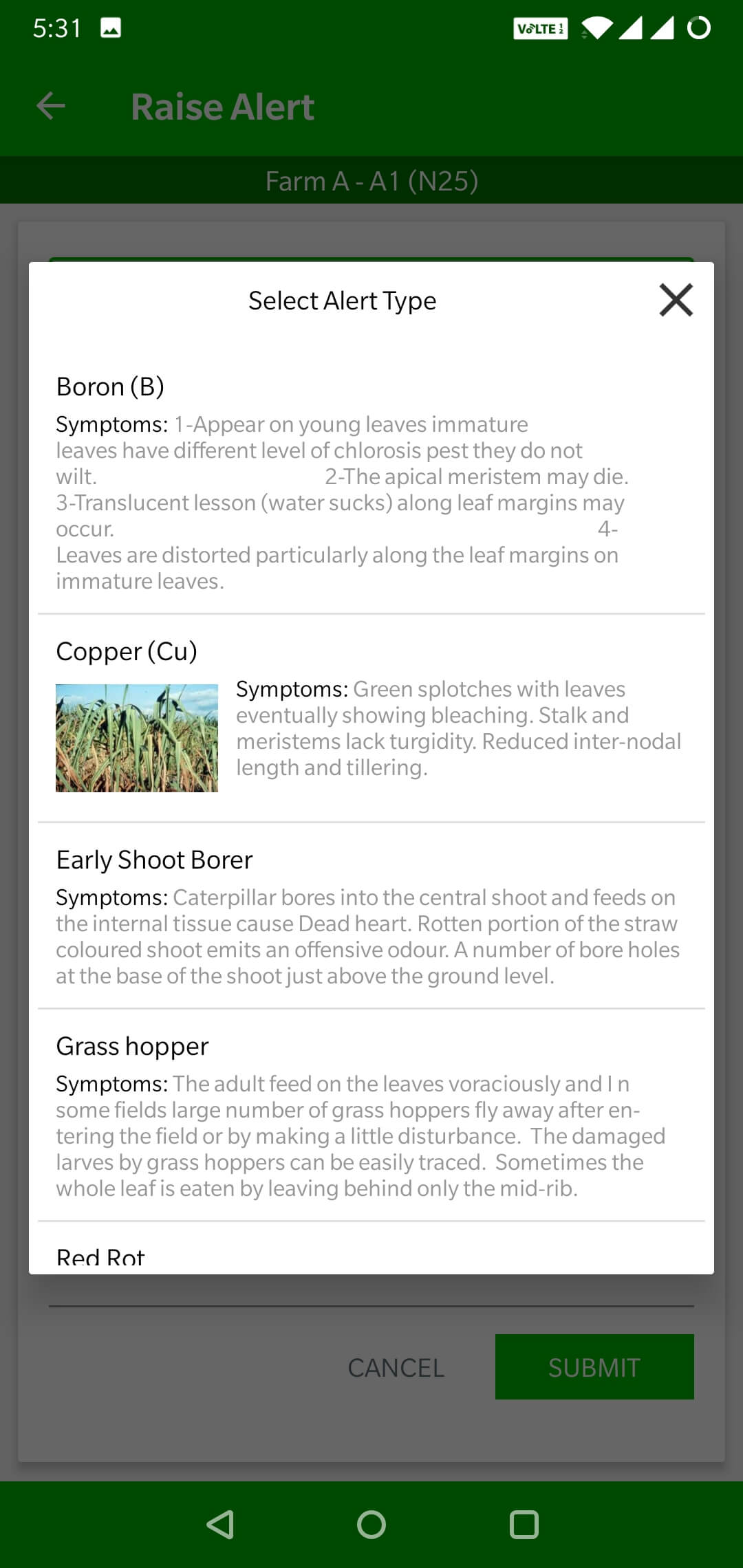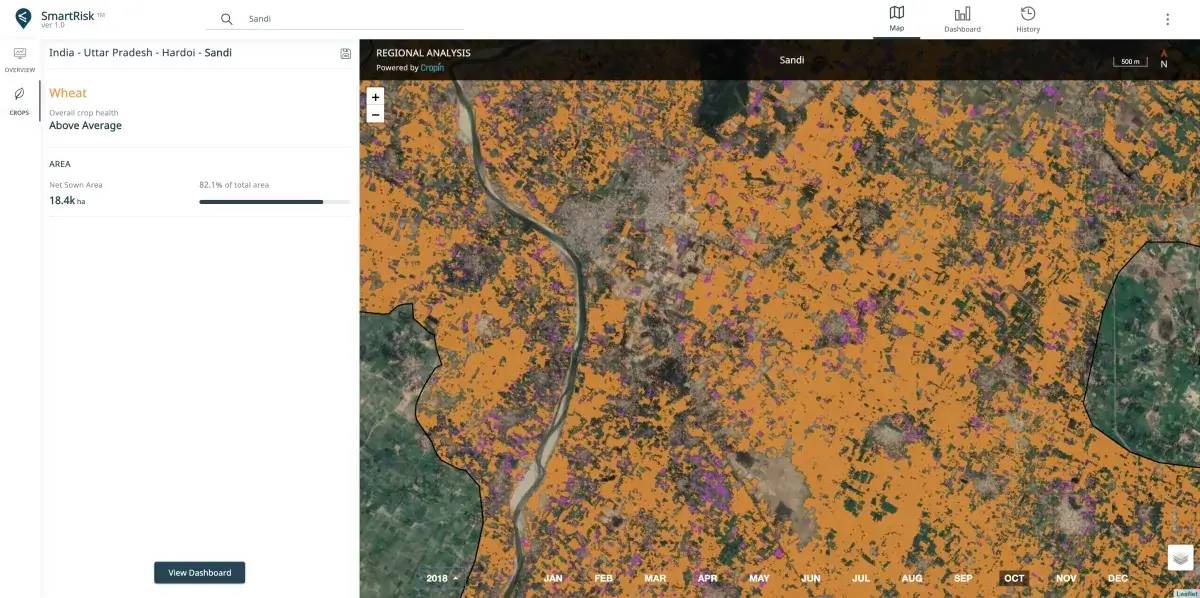Data-driven insights derived from satellite and ground data make scientific cultivation a reality for farmers. From farmer digitisation to meticulously planned and implemented development programs, smart farming technologies provide a solution for sustainable cultivation and improves farmer livelihoods the world over.
The world is changing, and we need to find smarter ways to sustain life without impacting the environment. Digital agriculture focuses on using data-driven insights to guide sustainable food production that is more productive and improves farmer livelihoods through a scientific method of food production. CropIn’s efforts to make agriculture sustainable for the current and future generations flow with many of the United Nations’ Sustainable Development Goals (SDG), including Goal 2: Zero Hunger, Goal 3: Good Health and Well-being, Goal 5: Gender Equality, Goal 6: Clean Water and Sanitation, Goal 8: Decent Work and Economic Growth, Goal 12: Responsible Consumption and Production, Goal 13: Climate Action, and Goal 17: Partnerships to achieve the Goal.
While several government schemes and initiatives are in place to help farmers on their digital journey, developmental agencies are integral for taking the movement to a grassroots level and implementing these programs at a farm and regional level.
Making digitization of farmers a reality at the village level
Despite significant technological leaps in agriculture, a majority of the farmers, especially in developing nations, rely on traditional methods of cultivation. There is immense pressure on land and water resources as we battle the impact of climate change coupled with a growing world population. Educating farmers about the benefits of scientific cultivation and empowering them with the tools they need to combat a changing world is the first step of smart agriculture.
-
- Easy tracking of day to day farming activities
- Crop health analysis
- Timely weather updates and alerts
- Empowering farmers with the latest agronomic news
- Automated alerts for every stage of cultivation

Improving farmer resilience in the face of climate change through climate-smart agriculture
Climate change impacts every single aspect of cultivation. From soil and water quality to changes in weather — the role of climate variability makes traditional agriculture even more unpredictable. Using smart farming technologies to educate farmers about changes in land composition and water management equips them to cultivate smarter with lesser risk.
- Information on soil and water composition
- Water stress mapping for better decision making
- Sustainable farming practices and water conservation
- Timely weather updates and forecast
- Farmer awareness of what to plant where and when
Enabling end-to-end traceability within the ecosystem to secure better prices for farmers and quality products for the end consumer
Farm-to-fork traceability is an increasingly relevant issue as consumers become conscious about what they consume. Farmers have to meet a number of standards to ensure their product is marketable and fit for consumption. Having a digital footprint helps establish a system of checks and controls throughout the cultivation process so that farmers can adhere to the quality requirements and, in turn, attract a higher price for their produce.
- Last-mile visibility for all agricultural produce
- Opening up access to newer markets
- Complete transparency between farmers and buyers
- Remote monitoring for a 360-degree coverage
- Ongoing crop health analysis
Ensuring farmer access to quality credit in a timely and systematic manner
The unpredictability of traditional agriculture makes it a less attractive sector for investment. But a lot of this has changed with smart farming technologies in agriculture. It opens up many avenues for farmers looking for credit, as well as investors searching for the right investment opportunity. Agencies working to bring the two worlds together can utilise real-time data to ensure that farmers have access to reliable and timely credit opportunities while investors get complete visibility into how their funds are being utilized.
- Agricultural credit risk assessment
- Regional-level live analytics throughout the cultivation cycle
- Accurate crop acreage and yield estimation
- Historical data insights on agricultural performance by region
- Timely financial assistance to farmers

Generating awareness among farmers about sustainable farming practices through weather-based and satellite advisory
The use of ground and satellite-based intelligence offers farmers the opportunity to limit the unpredictability of agriculture and increase productivity through smarter cultivation methods. Making farmers adopt digital technology is a slow process since they have been employing traditional methods for centuries. Showcasing a results-based approach through real-time monitoring is the only way to convince farmers of the merits of scientific cultivation.
- Crop health analysis
- Real-time alerts on diseases or pest attacks
- Timely weather updates and alerts
- Rule-based weather advisory
- Build farmer trust and credibility
Discover how this was made possible through CropIn’s collaboration with the Government of India and World Bank in a public-private project, which is enabling 8,000+ Indian farmers to digitally achieve climate-resilient farming across 1650+ hectares of farmland.
Smart Farming Technologies — Ensuring Sustainable Cultivation For The Future
Developmental agencies and other NGOs that support producers to improve their crop’s quality and quantity help bring about a transformative change at a grassroots level. Digital agriculture enables them to utilise data-driven insights to guide sustainable and climate-smart food production while also ensuring increased profit margins for smallholder farmers. CropIn’s multi-stakeholder platform also creates an environment for the development agencies to collaborate with investors and other stakeholders to provide the farmers with access to the inputs they require to boost their productivity.
Explore how a global non-governmental, humanitarian aid organisation leveraged CropIn’s agritech solution to collaborate with a global network of partners and transform the lives of smallholder farmers in Kenya.






